Unit1_Great_Scientists_warming-up&reading
- 格式:docx
- 大小:20.19 KB
- 文档页数:3
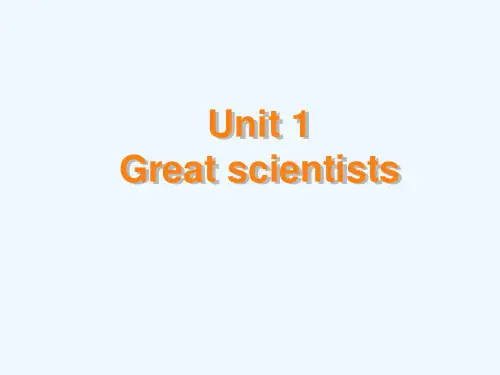
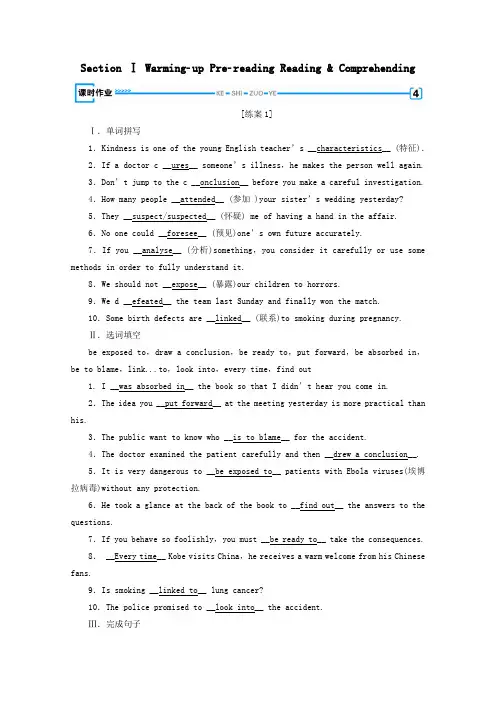
Section Ⅰ Warmingup Prereading Reading & Comprehending[练案1]Ⅰ.单词拼写1.Kindness is one of the young English teacher’s __characteristics__ (特征).2.If a doctor c __ures__ someone’s illness,he makes the person well again.3.Don’t jump to the c __onclusion__ before you make a careful investigation.4.How many people __attended__ (参加 )your sister’s wedding yesterday?5.They __suspect/suspected__ (怀疑) me of having a hand in the affair.6.No one could __foresee__ (预见)one’s own future accurately.7.If you __analyse__ (分析)something,you consider it carefully or use some methods in order to fully understand it.8.We should not __expose__ (暴露)our children to horrors.9.We d __efeated__ the team last Sunday and finally won the match.10.Some birth defects are __linked__ (联系)to smoking during pregnancy.Ⅱ.选词填空be exposed to,draw a conclusion,be ready to,put forward,be absorbed in,be to blame,link...to,look into,every time,find out1. I __was absorbed in__ the book so that I didn’t hear you come in.2.The idea you __put forward__ at the meeting yesterday is more practical than his.3.The public want to know who __is to blame__ for the accident.4.The doctor examined the patient carefully and then __drew a conclusion__.5.It is very dangerous to __be exposed to__ patients with Ebola viruses(埃博拉病毒)without any protection.6.He took a glance at the back of the book to __find out__ the answers to the questions.7.If you behave so foolishly,you must __be ready to__ take the consequences.8. __Every time__ Kobe visits China,he receives a warm welcome from his Chinese fans.9.Is smoking __linked to__ lung cancer?10.The police promised to __look into__ the accident.Ⅲ.完成句子1.Over the years several important theories have been __put forward__ (提出)by the professor.2.He __is expert in/at__ (精通)training animals because of his work experience in the zoo.3.We may safely __draw a conclusion__ (得出结论)that a parttime job can produce a farreaching impact on students.4.The doctor who __has cured him of his illness__ (治好了他的病)is very experienced and enjoys high reputation in the city.5.At that time, the police __suspected him of__ (怀疑他)having stolen the money.6.If children __are exposed to__ (接触到)the English environment, it is easier for them to learn English well.7.It is known to us that study must __be linked to__ (与……联系起来)practice.8.As we all know, water and salt __are absorbed into__ (被吸收进)our blood stream.Ⅳ.阅读理解Marie Curies,born in Sklodovka,Poland in 1876,led a hard life as a girl.Her parents,both teachers,had small salaries and were quite poor,especially after her mother stopped teaching to raise five children and take care of her poor health.Marie’s mother suffered from tuberculosis (肺结核) and died of it when Marie was ten.When Marie was small,she showed great interest in science.She loved to study and hoped to become a scientist when she grew up.Her parents encouraged her interest in science.Excellent as she was in her studies,she couldn’t go on with the advanced education she needed because Poland was then ruled by Russia and women were not permitted to go to college.In order to continue her education,she smoothed away many difficulties and entered Paris University,where she lived a simple life and studied hard,so she graduated with the highest grades in her class.After graduation she was engaged in scientific research in Paris University.There she met Pierre Curie,whom she married.Pierre joined her in her research into an unknown phenomenon “radiation”,which a certain scientist had declared that uranium gave off.The Curies spent several years trying their best to find the element that produced radiation.Finally they succeeded in 1902.Marie Curie won two Nobel Prizes,one for physics in 1906,together with her husband and another scientist; the other for chemistry herself in 1911.Madame Curie was a scientist of great achievement,and the first woman ever to be honored in the NobelPrize history.文章大意:本文主要介绍了居里夫人的人生中的一些重要的事情。
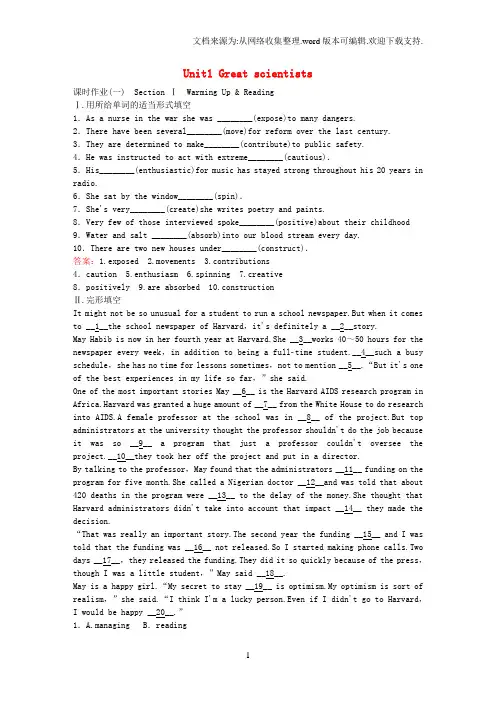
Unit1 Great scientists课时作业(一) Section ⅠWarming Up & ReadingⅠ.用所给单词的适当形式填空1.As a nurse in the war she was ________(expose)to many dangers.2.There have been several________(move)for reform over the last century. 3.They are determined to make________(contribute)to public safety.4.He was instructed to act with extreme________(cautious).5.His________(enthusiastic)for music has stayed strong throughout his 20 years in radio.6.She sat by the window________(spin).7.She's very________(create)she writes poetry and paints.8.Very few of those interviewed spoke________(positive)about their childhood 9.Water and salt ________(absorb)into our blood stream every day.10.There are two new houses under________(construct).答案:1.exposed 2.movements 3.contributions4.caution 5.enthusiasm 6.spinning 7.creative8.positively 9.are absorbed 10.constructionⅡ.完形填空It might not be so unusual for a student to run a school newspaper.But when it comes to __1__the school newspaper of Harvard,it's definitely a __2__story.May Habib is now in her fourth year at Harvard.She __3__works 40~50 hours for the newspaper every week,in addition to being a fulltime student.__4__such a busy schedule,she has no time for lessons sometimes,not to mention __5__.“But it's one of the best experiences in my life so far,”she said.One of the most important stories May __6__ is the Harvard AIDS research program in Africa.Harvard was granted a huge amount of __7__ from the White House to do research into AIDS.A female professor at the school was in __8__ of the project.But top administrators at the university thought the professor shouldn't do the job because it was so __9__ a program that just a professor couldn't oversee the project.__10__they took her off the project and put in a director.By talking to the professor,May found that the administrators __11__ funding on the program for five month.She called a Nigerian doctor __12__and was told that about 420 deaths in the program were __13__ to the delay of the money.She thought that Harvard administrators didn't take into account that impact __14__ they made the decision.“That was really an important story.The second year the funding __15__ and I was told that the funding was __16__ not released.So I started making phone calls.Two days __17__,they released the funding.They did it so quickly because of the press,though I was a little student,”May said __18__.May is a happy girl.“My secret to stay __19__ is optimism.My optimism is sort of realism,”she said.“I think I'm a lucky person.Even if I didn't go to Harvard,I would be happy __20__.”1.A.managing B.readingC.hearing D.writing2.A.boring B.simpleC.easy D.different3.A.actually B.hardlyC.usually D.really4.A.Due to B.According toC.But for D.Instead of5.A.beliefs B.sportsC.accidents D.attitudes6.A.covered B.talkedC.spoke D.took7.A.duty B.moneyC.work D.pay8.A.front B.faceC.charge D.time9.A.important B.weakC.light D.regular10.A.And B.SoC.Or D.But11.A.advised B.missedC.delayed D forgot12.A.aimlessly B.immediatelyC.slowly D.continuously13.A.caught B.broughtC.tied D.led14.A.when B.as ifC.even if D.after15.A.came across B.came outC.came away D.came up16.A.even B.everC.just D.still17.ter B.beforeC.ago D.then18.A.nervously B.proudlyC.madly D.curiously19.A.sad B.upsetC.happy D.grateful20.A.at last B.in timeC.as well D.once more语篇解读:本文是一篇记叙文。
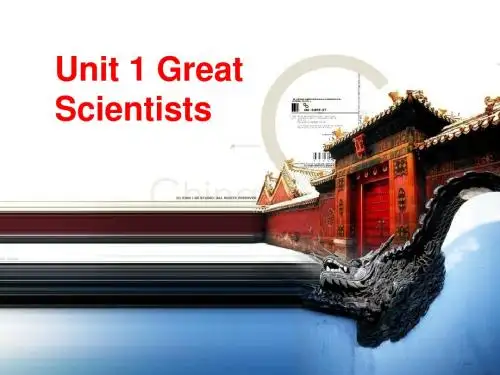
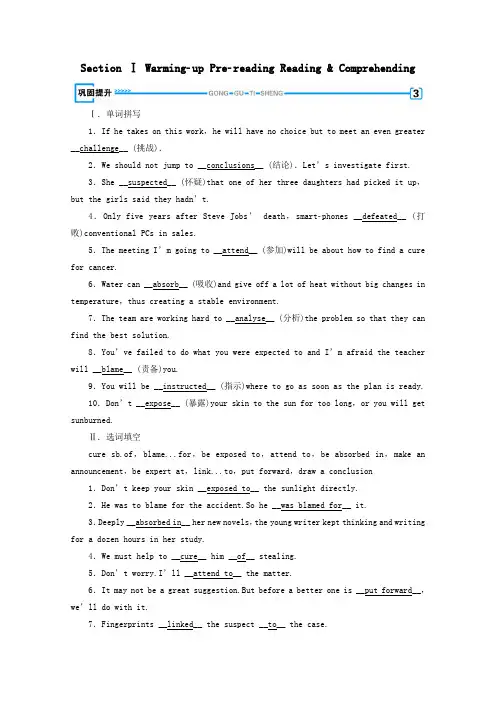
Section Ⅰ Warmingup Prereading Reading & ComprehendingⅠ.单词拼写1.If he takes on this work,he will have no choice but to meet an even greater __challenge__ (挑战).2.We should not jump to __conclusions__ (结论).Let’s investigate first.3.She __suspected__ (怀疑)that one of her three daughters had picked it up,but the girls said they hadn’t.4.Only five years after Steve Jobs’ death,smartphones __defeated__ (打败)conventional PCs in sales.5.The meeting I’m going to __attend__ (参加)will be about how to find a cure for cancer.6.Water can __absorb__ (吸收)and give off a lot of heat without big changes in temperature,thus creating a stable environment.7.The team are working hard to __analyse__ (分析)the problem so that they can find the best solution.8.You’ve failed to do what you were expected to and I’m afraid the teacher will __blame__ (责备)you.9.You will be __instructed__ (指示)where to go as soon as the plan is ready.10.Don’t __expose__ (暴露)your skin to the sun for too long,or you will get sunburned.Ⅱ.选词填空cure sb.of,blame...for,be exposed to,attend to,be absorbed in,make an announcement,be expert at,link...to,put forward,draw a conclusion 1.Don’t keep your skin __exposed to__ the sunlight directly.2.He was to blame for the accident.So he __was blamed for__ it.3.Deeply __absorbed in__ her new novels,the young writer kept thinking and writing for a dozen hours in her study.4.We must help to __cure__ him __of__ stealing.5.Don’t worry.I’ll __attend to__ the matter.6.It may not be a great suggestion.But before a better one is __put forward__,we’ll do with it.7.Fingerprints __linked__ the suspect __to__ the case.8.She __is expert at__ making cheap but stylish clothes.9.After a heated discussion,they __drew a conclusion__ in the end. 10.The government __made an announcement__ about changes in the drug war. Ⅲ.单句改错1.To conclusion,I would like to thank you for all your help.__To→In或conclusion→conclude__2.When I said I ran faster than her,she challenged to me to a race.__去掉challenged后面的to__3.The police blamed the traffic accident for Jack.__for→on__4.Please announce students that the holidays will begin next Monday.__在announce后加to__5.This brochure provides detailed instruction on how to repair a phone. __instruction→instructions__6.He ran such quickly that we all couldn’t catch up with him.__such→so__7.Neither he nor his parents has seen the film.__has→have__8.I felt nervous for the first time I spoke in public.__去掉for__9.Absorb in his work,Tom forgot to inform her of it.__Absorb→Absorbed__10.She suspected him with telling lies and never trusted him again.__with→of__。
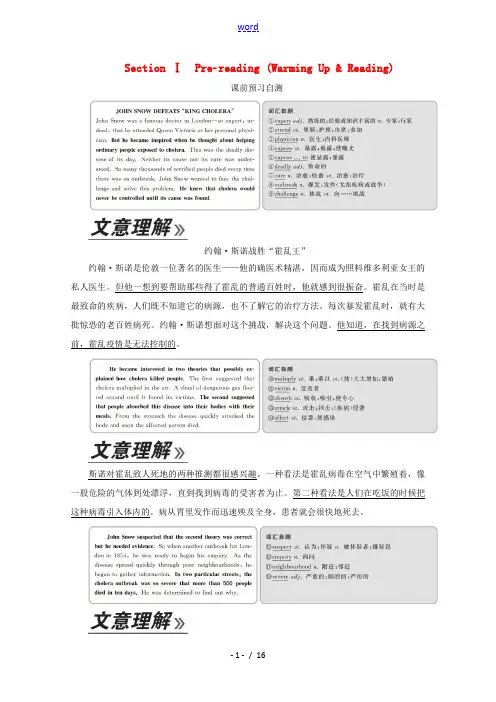
Section ⅠPrereading (Warming Up & Reading)课前预习自测约翰·斯诺战胜“霍乱王”约翰·斯诺是伦敦一位著名的医生——他的确医术精湛,因而成为照料维多利亚女王的私人医生。
但他一想到要帮助那些得了霍乱的普通百姓时,他就感到很振奋。
霍乱在当时是最致命的疾病,人们既不知道它的病源,也不了解它的治疗方法。
每次暴发霍乱时,就有大批惊恐的老百姓病死。
约翰·斯诺想面对这个挑战,解决这个问题。
他知道,在找到病源之前,霍乱疫情是无法控制的。
斯诺对霍乱致人死地的两种推测都很感兴趣。
一种看法是霍乱病毒在空气中繁殖着,像一股危险的气体到处漂浮,直到找到病毒的受害者为止。
第二种看法是人们在吃饭的时候把这种病毒引入体内的。
病从胃里发作而迅速殃及全身,患者就会很快地死去。
斯诺推测第二种说法是正确的,但是他需要证据。
因此,在1854年伦敦再次暴发霍乱的时候,约翰·斯诺着手准备对此进行调研。
当霍乱在贫民区迅速蔓延的时候,约翰·斯洛就开始收集资料。
他发现特别在两条街道上霍乱流行得很严重,在10天之内就死去了500多人。
他决心要查明其原因。
首先,他在一X地图上标明了所有死者住过的地方。
这提供了一条说明霍乱起因的很有价值的线索。
许多死者是住在宽街的水泵附近(特别是这条街上16、37、38、40号)。
他发现有些住宅(如宽街上20号和21号以及剑桥街上的8号和9号)却无人死亡。
他以前没预料到这种情况,所有他决定深入调查。
他发现,这些人都在剑桥街7号的酒馆里打工,而酒馆为他们免费提供啤酒喝,因此他们没有喝从宽街水泵抽上来的水。
看来水是罪魁祸首。
接下来,约翰·斯诺调查了这两条街的水源情况。
他发现,水是从河里来的,而河水被伦敦排出的脏水污染了。
他马上叫宽街上惊慌失措的老百姓拆掉水泵的把手。
这样,水泵就用不成了。
不久,疫情就开始得到缓解。
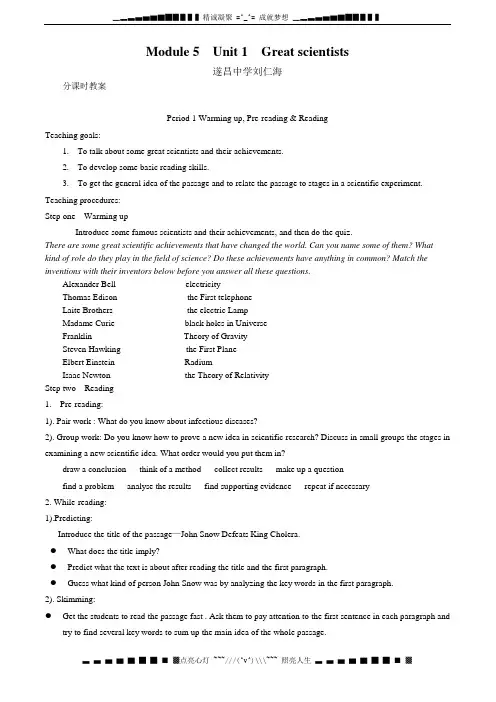
Module 5 Unit 1 Great scientists遂昌中学刘仁海分课时教案Period 1 Warming up, Pre-reading & ReadingTeaching goals:1.To talk about some great scientists and their achievements.2.To develop some basic reading skills.3.To get the general idea of the passage and to relate the passage to stages in a scientific experiment. Teaching procedures:Step one Warming upIntroduce some famous scientists and their achievements, and then do the quiz.There are some great scientific achievements that have changed the world. Can you name some of them? What kind of role do they play in the field of science? Do these achievements have anything in common? Match the inventions with their inventors below before you answer all these questions.Alexander Bell electricityThomas Edison the First telephoneLaite Brothers the electric LampMadame Curie black holes in UniverseFranklin Theory of GravitySteven Hawking the First PlaneElbert Einstein RadiumIsaac Newton the Theory of RelativityStep two Reading1.Pre-reading:1). Pair work : What do you know about infectious diseases?2). Group work: Do you know how to prove a new idea in scientific research? Discuss in small groups the stages in examining a new scientific idea. What order would you put them in?draw a conclusion think of a method collect results make up a questionfind a problem analyse the results find supporting evidence repeat if necessary2. While-reading:1).Predicting:Introduce the title of the passage—John Snow Defeats King Cholera.●What does the title imply?●Predict what the text is about after reading the title and the first paragraph.●Guess what kind of person John Snow was by analyzing the key words in the first paragraph.2). Skimming:●Get the students to read the passage fast . Ask them to pay attention to the first sentence in each paragraph andtry to find several key words to sum up the main idea of the whole passage.●Compare what the students have predicted with the content given by the author.●Read the passage again to get the general idea of each paragraph.Para.1: The causes of cholera.Para.2: The correct or possible theory.Para.3: Collect data on those where people were ill and died and where they got their water. Para.4: Plot information on a map to find out where people died or did not die.Para.5: Analyse the water to see if that is the cause of the illness.Para.6: Find other evidences to confirm his conclusion.Para.7: The polluted dirty source of drinking water was to blame for the cause of the London cholera.3). Scanning:●Read the passage and try to put the correct stages into the reading about research into a disease.A. draw a conclusionB. think of a methodC. collect resultsD. make up a questionE. find a problemF. analyse the resultsG. find supporting evidenceH. repeat if necessaryKeys: E→D→B→C→F→G→A●Answer some detailed questions about the passage and learn some language points:1. Wha t do you know about Dr. John Snow’s being well-known in London?(He attended Queen Victoria to ease the birth of her babies.).e.g. I may be late – I have got one or two things to attend to.Mother had to attend to her sick son .2. From what disease did Londoners suffer in his age?(They exposed themselves to cholera.).e.g. The wolf opened its mouth to expose a row of sharp teeth.Don’t expose your skin to the sun; your skin will be hurt.People in many provinces of China exposed themselves to the SARS in 2003.3. Did people know how to cure the disease?e.g Aspirin is said to be a wonderful cure for the pain.Although the boy was beyond cure, his parents tried to cure him of bad habits.4.When did Dr. Snow think the disease would be controlled?(He knew he would never be controlled until its cause was found.)e.g. The Ministry of Health has set up a program to control the spread of AIDSThe buttons control the temperature in the building5. What was the second theory explaining how the disease killed people?(People absorbed this disease into their bodies with their meals.)be absorbed in = concentrate oneg. He is absorbed in the research of Chinese history recently.absorb one’s attentioneg. Chinese history absorbs his attention recently.5.How serious was the disease outbreak in London?(The cholera outbreak was so severe that more than 500 people had died in 10 days.)e.g. He has such a severe illness that he has been in hospital.I was caught in a severe storm last night and couldn’t go back home in time.7. Did the map which Dr. Snow draw help find the cause of the disease?(The map gave a valuable clue about the cause of the disease.)e.g. -- What is the value of this 18k white gold diamond necklace?-- It cost me $2,000 (=It was worth $2,000.),but I valued the necklace at $1,000.It was a valuable diamond necklace.We never know the value of water till the well is dry.8. Where were many of the deaths in Broad Street?(Many of the deaths were near the water pump in Broad Street.)e.g. If you have a flat tyre, you will pump air into the tyre.We had a debate yesterday. The lively debate really pumped us up.9. Why did some houses have no deaths?(These families worked in the pub at 7 Cambridge Street. They were given free beer and so had not drunkthe water from the Broad street pump.)10. What did Dr. Snow think was responsible for the disease?(It seemed the water was to blame.)e.g. They blamed the secretary for the delay of the plan.The driver was not to blame for the traffic accident.He is ready to take the blame for what had happened.11. What did Dr. Snow advised the people in Broad Street do?(He told the people to remove the handle from the water pump so it could not be used.)12. What else did Dr. Snow find in another part of London that were linked to the Broad Street outbreak?(In addition, he found 2 other deaths.)e.g. The new bridge will link the island to the mainland.Compare: in addition, also, as well as, besidesIn addition to apples you asked for, I bought you some oranges.13. What conclusion did Dr. Snow tell the public?(He announced that polluted water carried the disease.)e.g. The captain announced that the plane was going to land.The army announced a cease-fire.14. What did Dr. Snow tell the water companies?(They were instructed not to expose people to polluted water anymore.)e.g. She instructed me in the use of this telephone.I've been instructed to wait here until the lecturer arrives.3. Post-reading:Work in groups of four and discuss the following questions:1).What should you do if you're traveling to a country that has a cholera outbreak according to Snow’s theory? (Drink only water that you have boiled or treated with chlorine or iodine. Other safe drinks include tea or coffee made with boiled water and carbonated, bottled beverages with no ice. Eat only food that's been thoroughly cooked and is still hot, or fruit that you've peeled yourself. Avoid undercooked or raw fish and shellfish. Avoid raw salads and vegetables. Avoid food and drinks from street vendors.)2.) What spirit can we find in John Snow? As a student, what should we learn from him? Step three ConsolidationListen to the tape and get a better comprehension of the passage. While listening , pay special attention to the new words and expressions as well as the sentence structures they have learned. Step four Homework1.Read the passage aloud after class.2.Prepare for comprehending and learning about language.3.Writing: What I think of John Snow.Period 2 Comprehending & learning about language.Teaching goals:1.To find the scientific report by John Snow and to further understand the passage.2.To get a better understanding of the passage.3.To discover useful words and expressions, structures.Teaching procedures:Step one Revision1.Ask some students to read the text aloud fluently.2.Check the homework exercises.Step two Comprehending1.Fill in the chart after reading the passage.2.Read the passage again and answer these questions.1). Cholera was a 19th century disease. What disease do you think is similar to cholera today?2). John Snow believed Idea 2 was right. How did he finally prove it?3). Do you think John Snow would have solved this problem without the map? Give a reason.Step three Learning about the language1.Discovering useful words and expressions.1)Choose the suitable words or expressions to complete this passage: valuable, instruct, cure, expose, look into, examine, put forward, immediately, announceLi Heping was a famous football player, but his career came to an end when he became very ill. The doctor _________ him but could not find the cause of this illness. He___________ the theory that Li Heping had been _______ to a new virus. He knew he would not be able to ____ him___________, but promised he would ________the possibility of finding one in the future. Sadly, Li Heping __________ that he would take up a new career to _______ footballers in planning for the future. At his last match he thanked his fans for their _______ support by singing the popular song: “Thanks for the memory”.2). Sometimes in English we put the verb make with a noun instead of using a simple verb; for example, make a mistake instead of to mistake. Look at these simple verbs and make another construction using make + a + noun.3). In English verbs like make are very active and useful. Try to remember them and make sentences with the following words.make a face make friends make money make up one’s way to make suremake a decision make up one’s mind make the bed make room for4). This is a report on living conditions in England in the nineteenth century. Choose the correct verb or conjunction to put into the text. Each word may be used only once.link ... to blame expose ... to testdefeat reject absorb examine severe connect…toIn the twenty-first century, educated people find it difficult to believe that living conditions in the nineteenth century ______ people ___ serious illnesses. The reports of many doctors ____illness ___ drinking polluted water. However, one hundred years ago people did not _____a disease ___ the environment. So they did not _____ the companies that supplied dirty water. The doctors found that the dirtier the water, the more ______ the illness. It was only later when people began to ________ the water and ____ its quality that they _______ the idea that cholera was_________ from the air. It was only when everybody began to attack the dirty conditions that cholera was________ and was not a problem any more.2.Discovering useful structures.1). Look at the following sentences where the past participle is used, and find two more examples in thereading passage.Examples: So many thousands of terrified people died. (Attribute)Doctor John Snow was a well-known doctor in London.John Snow told the astonished people in Broad Street.But he became inspired when he thought about helping ordinary people.(Predicative)He got interested in the two theories.Neither its cause, nor its cure was understood.2). Complete the table with phrases that have the same meaning.3). Complete the sentences using the past participle as the predicative.1.He got ______ about losing the money.2.Why do you always look so ____? Do you sleep well these days?3.I was ___________ with the film I saw last night. I had expected it to be better.4.Everybody was ________________ to hear the death of the famous film star.5.The children are really _______ about going to the zoo.6.His wound became _______with a new virus.4). Rewrite the following sentences with the past participle as attributive.1.Let’s try the bookstore that was opened last month.(Let’s try the bookstore opened last mo nth.)2. Nine out of ten women who were interviewed about the product said they liked it.(Nine out of ten women interviewed about the product said they liked it.)3. Yesterday, the President went to visit the workers who had retired.(Yesterday, the President went to visit the retired workers.)Step four Homework1.Go through the grammar items on p89 and finish Using Structures on p44.2.Finish the exercises about using words and expressions on p42.Period 3 Listening and speakingTeaching goals:1.To learn how to get required information by listening.2.Be familiar with some expressions about describing a person’s qualities.3.Practise communicating with their classmates about their futures realistically.Teaching procedures:Step one Listening:1.Lead in: A brief introduction to Fei Junrong and Nie haisheng, and then lead to the famous scientist QianXueshen.2.Explain some new words which will appear in the listening material--astronomer (天文学家), astronaut (宇航员)institute (研究所)then read the questions and ask the students to guess what this passage may be about.3.Listen to the passage twice, then let the students answer these questions.4.Play the tape once again, and check the answers together.Step two Speaking:In pairs discuss what scientific job each of you would like to choose in the future.1.These questions may help you:What job do you want to do?What education will you need? What personality will be needed?How long will the training take?What work experience would be useful?How will you prepare for this career?2.Theses expressions may help you:I always wanted to.. because…I might find it difficult to …My greatest problem will be to …Theexperience I will need is…I need to practise…I will need to be /become: patient, creative, hard-working, co-operative, confident, brave, positive, pleasant, polite, determined, energetic, strict with…3. Let the students practise it in pairs, then ask some of them to give the report.4. Show the slides of the sample conversation.Sample conversation:A : What do you want to do when you grow up?B: I want to build robots. I will have to do a physics and mathematics degree in China. After that I hope to go abroad to Reading University in England where you can study all about robots. There is a special cybernetics(控制论) department there.A: Why personality will be needed for that job?B: They have a lot of uses: for example, in making cars on a production line or doing other repetitive jobs.A: What personality will be needed for that job?B: I think I need to be patient for my ideas will take a long time to develop. I also need to be creative enough to have good ideas.A: What experience will be most useful to you?B: I think technology and engineering projects. I hope to work in a factory in my holidays.A: What kind of person makes a good inventor?B: I think someone who is happy to persevere at something and learns from his mistakes.A: Thank you. I think designing robots sounds fun.Step three Listening. (p.41)1. Some short introduction to this passage and some new words in it. New words in the listening passage:species (种类),parrot (鹦鹉) blackbird (乌鸦)2. Read the questions before listening to the tape.3. Listen to it twice.4. Finish the exercises on p41, then check the answers.5. Show the slides of the reading text and listen again if necessary.Step 4 Homework:1. Do the listening task on P44.2.Writing: What I would like to be in the future.Period 4 Reading, writing and learning tipsTeaching goals:1.To learn about Copernicus’ revolutionary theory.2.To learn to write a persuasive essay and improve their integrating skills .Teaching procedures:Step one Pre-readingWe know the first scientist is Copernicus. He was one of the first scientists to use mathematical observations to collect information. He believed the sun is the center of the universe and the earth and other planets went around it. The chart on P.7 shows his theory.Let’s enjoy a video of Copernicus’ Revolutionary Theory.Step two While-reading1 Skimming:Read through the passage fast and try to get the main idea of the passage.2. Scanning:Scan the passage and find the experiences of CopernicusBirth: February 19, 1473Death: May 24, 1543Place of Birth: Toruń, PolandCareer:1491-1494 Studied mathematics at Kraków Academy1496 Went to Italy to study astronomy and law at the University of Bologna1497 Began observations of the Sun, Moon, and planets1514Wrote Commentariolus, an outline of his astronomical ideas, but did not circulate it widely1543Published De Revolutionibus Orbium Coelestium (On the Revolutions of the Celestial)●Read through the passage again, and tell whether the following statements are true or false.1. At Copernicus’ time, Christian Church was in charge of many western countries.2. Copernicus noticed that observed from the earth, some planets appears in front of or behind the earth.3. Copernicus didn’t show his new theory to his friends until he completed it.4. His friends were not interested in his ideas.5. Since he was not afraid of being attacked by the Church, Copernicus published his book as soon as hefinished working on it.6. Newton, Einstein, and Hawking are all scientists who made contribution to the study of the universe.Step three Explain some language points1. Fill in the blankets with proper words.1) Mao Zedong is the great leader of the Chinese R_________.2) The Invention of the computer caused a r________ in our way of living.3) Sun Zhongsan is a great r___________ leader.4) Yuan Longping created a r___________ new way of growing rice.2. lead to: to result in 导致Your carelessness will lead to the trouble in the future.3. make sense1) to have a clear meaningNo matter how I tried to read it, the sentence didn't make sense.2) to be wise course of actionIt makes sense to take care of your health.4. spin--- spun(span)--- spinninge.g. We span the coin to see who would have first turn.I spun around to see who had spoken.5. If you don’t like Tom, you may r_____ his gift.If you don’t think the suggestion is suitable for you, you may r____ it.6. enthusiastic: be interested inShe’s very ______________________ singing.We explain our plan, and he is very___________.enthusiastic enthusiasm enthusiasticallyShe shows boundless __________ for the work.She greeted him _____________ with a kiss.She is very __________ about Eastern music.7. cautious-- cautiously :careful to avoid riskbe cautious about/of sb./sth.e.g. The bank is very cautious about lending money.My father is a very cautious driver.The guard warned me to be cautious about strangers.Step four DiscussionIf you were Nicolaus Copernicus, would you have hidden your theory for so many years? Give a reason. (Suggested answer:As a scientist, Copernicus was more cautious than coward. If he had published his ideas at his time, he would have been killed just as Bruno who was burnt to death because his theory was against the Christian Church’s. Every time when a new idea appears, there are always rejections. It’s normal. Scientists should have patience to spread their truth..)Step five Writing1. Now write a short letter asking Copernicus to publish his ideas so everyone can read them.2. Learning tips.This article is a persuasive writing, which is about changing somebody else’s point of view. When you are doing this kind of writing, you must always have some evidence to support your idea. To make this easier, you can hold discussions with your family and friends. Give your ideas and reasons to them whenever you are making choices. You may argue with them and try to persuade them. Then you will find it easier to do your persuade writing.However, when you are writing, do not forget to plan your work and put your ideas in a logical order.Now please discuss in a group of four and decide how to write this letter. Try to collect your ideas and make a plan. You can read the tips given to you in Ex.3 on page 7.Here is a plan:Beginning: Tell Copernicus who you are and why you want him to publish his ideas.Paragraph 1: Reason 1 and evidence.Paragraph 2: Reason 2 and evidence.Summing up: Ask him to think again about publishing his ideas.3. Sample writingDear Nicolaus Copernicus,I am a student studying astronomy and I would very much like to read your new theory about the solar system. I hope you will publish it for several reasons.I understand the problems with the present theory. The way the planets move is not what you would expect if the earth was the centre of the universe. It is also odd that the brightness of some stars seems to change. So I agree with you that we need a new theory.I know your observations have been very carefully carried out over many years. Now you must have the courage to publish them. Science can never advance unless people have the courage of their beliefs. I know you worry about what will happen if you publish your new theory.No matter how people oppose it, time will show if your ideas are right or wrong.So I hope you will feel you can publish your new theory.Yours sincerely,(your name)Step six Homework1. Write down your persuasive essay on your exercise books.2. Review the whole unit and prepare for the dictation.Period 5 Summing up & AssessmentTeaching goals:1.To know about what they have learned in this unit.2.To check their work and give a self-assessment.Teaching procedures:Step one Revision1. Have a dictation of the words and expression learned in this unit.scientific conclude repeat defeat attend expose control blame immediately announce complete cautious put forward draw a conclusionin addition link…to apart from lead to make sense point of view2. Translate the following sentences(p42)1) 除了公园以外,这个夏天我就没有出过公寓。
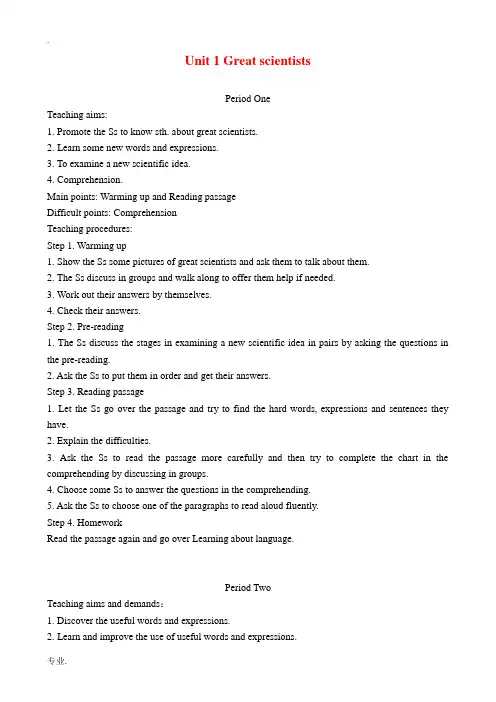
Unit 1 Great scientistsPeriod OneTeaching aims:1. Promote the Ss to know sth. about great scientists.2. Learn some new words and expressions.3. To examine a new scientific idea.4. Comprehension.Main points: Warming up and Reading passageDifficult points: ComprehensionTeaching procedures:Step 1. Warming up1. Show the Ss some pictures of great scientists and ask them to talk about them.2. The Ss discuss in groups and walk along to offer them help if needed.3. Work out their answers by themselves.4. Check their answers.Step 2. Pre-reading1. The Ss discuss the stages in examining a new scientific idea in pairs by asking the questions in the pre-reading.2. Ask the Ss to put them in order and get their answers.Step 3. Reading passage1. Let the Ss go over the passage and try to find the hard words, expressions and sentences they have.2. Explain the difficulties.3. Ask the Ss to read the passage more carefully and then try to complete the chart in the comprehending by discussing in groups.4. Choose some Ss to answer the questions in the comprehending.5. Ask the Ss to choose one of the paragraphs to read aloud fluently.Step 4. HomeworkRead the passage again and go over Learning about language.Period TwoTeaching aims and demands:1. Discover the useful words and expressions.2. Learn and improve the use of useful words and expressions.Main points: Learn to use the words and expressions that the Ss discover.Difficult points: Improve the use of the words and expressions.Teaching procedures:Step 1. Learning about language1. Discover the useful words and expressions in this unit in groups of four.2. Ask the Ss to show their results to the class.3. Ask them to study the words and expressions in Ex.1.4. Ss have a discussion and do the exercises.5. Check their answers.6. Change the verbs into nouns and make sentences by using “make a …〞Step 2. Using words and expressions1. Make sure the Ss know the words and expressions.2. Let the Ss work in groups to complete the blank in Ex.1.3. Check their answers.4. Do the translations. Ss discuss the sentences and the translate them into English, using the words and phrases in brackets.Step 3. Words learning1. Show the Ss a list of prefixes to talk about them.2. Ask them to work in groups to find some words with the prefixes and study their meanings.3. Let them show their results to the class.4. Walk around the class to give them help if needed.Step 4. Study the use and meanings of suggest1. Study the meaning of suggest by looking the dictionary entry.2. Match the meanings with the sentences on the right in Ex.4.3. Check their answers.Step 5. HomeworkTeaching aims and demands:1. Discover the useful structure.2. Learn to use the grammar of past participle.3. Enable the Ss understand the past participle using as attribute and predicative.Main points: Learn the usage of the past participle using as attribute and predicative.Difficult points: Use the useful structure.Teaching procedures:Step 1. RevisionReview the past participle of some verbs.Step 2.1. Look at the chart and study the phrases.Past participle as the attribute and the predicative(1) terrified people(2) reserved seats(3) polluted water(4) a crowded room(5) a pleased winner(6) children who look astonished(7) a vase that is broken(8) a door that is closed(9) the audience who feel tired(10) an animal that is trapped3. Ask the Ss the following questions:(1) What kind of words before the past participles?(2) What kind of words after the past participles?4. Ask the Ss find the sentences using the past participle in the reading passage.5. Ss have a discussion and complete the chart with the same meaning of the phrases above.6. Ss show their results to the class.7. Complete the sentences in Ex.3.Step 3. Using structure1. Make sure the Ss know the words and the discuss in groups to finish the sentences using past participle.(Ex.1)2. Rewrite the sentences into one sentence using the past participle as the attribute or predicative.3. Check their answers.Step 4. HomeworkWrite down 1, 3, 5, 7 of Ex.2 in the exercise book.Period FourTeaching aims and demands:1. Improve the Ss listening skills.2. Know more about great scientists.Main points: Listening and speakingDifficult points: Get to know the information of listening materials.Teaching procedures:Step 1. Listening and speaking1. Listen to the tape and answer the questions.(1) What did Qian Xuesen study first?(2) What experience did he get in America that was very useful for China?(3) What was Qian Xuesen’s achievement when he returned to China from America?(4) How has he been honoured in China?(5) How did Steve honour him?Step 2. Speaking1. Ss discuss what scientific job they will do in the future in pairs by using the questions and expressions on Page 6.2. Ask some Ss to talk in class.Step 3. Listening and talking1. Play the tape for the Ss to listen and finish the exercises in the workbook, pause from time to time if needed.2. Check their answers.3. Work in pairs. Imagine you are going to meet a specialist about a newly-found flower by using the useful sentences on Page 42.Step 4. Listening task1. Play the tape for the Ss to get the information of the listening task.2. Check their answers.Step 5. HomeworkPrepare the reading task.Period FiveTeaching aims and demands:Improve the Ss reading skills and their talent in getting the information.Main points: Reading and reading taskDifficult points: Finding the Euler path.Teaching procedures:Step 1. RevisionRevise the past participle used as the attribute and predicative.Step 2. Reading1. Ss read the passage as fast as they can and then draw the two theories of the universe in groups.2. Ask the Ss to show their pictures to the class.3. Ss read the passage again and find the problems they have.4. Solve the Ss’ problems.5. Discuss in pairs. If you were Nicolaus Copernicus, would you have hidden your theory for so many years? Why?6. Choose some Ss to share their ideas to the class.Step 3. Reading task1. Ss read the passage and answer the following questions.(1) What is odd point? (2) What is even point? (3) What rule did Euler find?2. Ss discuss in groups and try to find the answers.3. Teacher walks around to offer them help.4. Use the rule to see if you can go over the diagram, not missing any points or going over any line twice.( See figures on Page 46)5. Ss work in groups.Step 4. HomeworkWrite a short passage about Copernicus.Period SixTeaching aims and demands:1. Try to write sth persuasive.2. Learn to write a report about people.Main points:Make a plan in discussion.Difficult points:Write a passage / a report.Teaching procedures:Step 1. Writing1.Ask the Ss to read the passage again and gather some information about Copernicus.2. Plan to write a letter.Step 2. Writing taskWrite a report about your scientist, his/her life, achievements and the key to his/her success.1. Before you begin to write, remember to put your information under three headings: life, achievements and key to success.2. Plan your report like the one on P47.3. Ask them to read their plans.4. Begin to write the report.Step 3. HomeworkComplete the report and write down on the exercise book.。
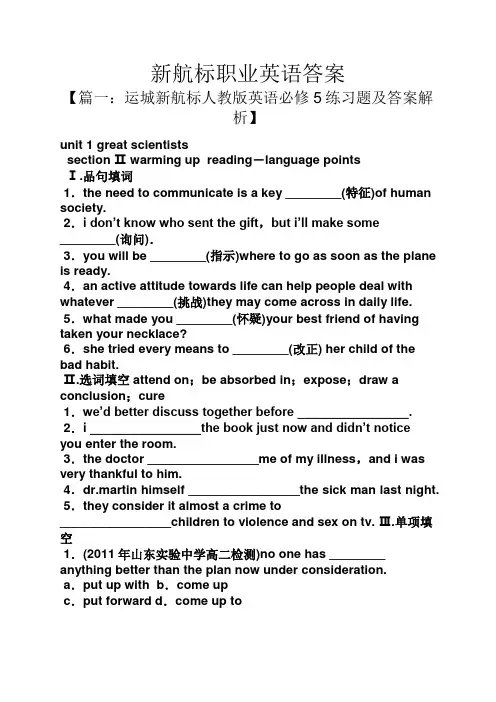
新航标职业英语答案【篇一:运城新航标人教版英语必修5练习题及答案解析】unit 1 great scientistssection Ⅱ warming up reading-language pointsⅠ.品句填词1.the need to communicate is a key ________(特征)of human society.2.i don’t know who sent the gift,but i’ll make some________(询问).3.you will be ________(指示)where to go as soon as the plane is ready.4.an active attitude towards life can help people deal with whatever ________(挑战)they may come across in daily life.5.what made you ________(怀疑)your best friend of having taken your necklace?6.she tried every means to ________(改正) her child of the bad habit.Ⅱ.选词填空 attend on;be absorbed in;expose;draw a conclusion;cure1.we’d better discuss together before ________________.2.i ________________the book just now and didn’t notice you enter the room.3.the doctor ________________me of my illness,and i was very thankful to him.4.dr.martin himself ________________the sick man last night. 5.they consider it almost a crime to________________children to violence and sex on tv. Ⅲ.单项填空1.(2011年山东实验中学高二检测)no one has ________ anything better than the plan now under consideration.a.put up with b.come upc.put forward d.come up to2.(2011年合肥168中学高二检测)mary thought highly of the painting,but to mr.smith’s ________eye,the painting was terrible.a.eagerb.extrac.exactd.expert3.(2011年白鹭洲高二检测)her pale face suggested that she________ badly ill and i suggested she ________to hospital without delay.a.be;should be sent b.was;be sentc.be;was sentd.was;was sent4.(2009年高考山东卷)so sudden ________that the enemy had no time to escape.a.did the attackb.the attack didc.was the attackd.the attack was5.she was so________in her job that she didn’t hear anybody knocking at the door.a.attracted b.absorbedc.drawnd.focused6.he isn’t like his brother________in appearance________in character.a.both;andb.neither;norc.not only;but alsod.either;or7.mr.green stood up in defence of the 16-year-old boy, saying that he was not the one________.a.blamedb.blamingc.to blame d.to be blamed8.—don’t forget to phone me when you get home.just to let me know you’ve arrived safely. —i won’t forget.good-bye then. a.with pleasureb.it’s kind of youc.don’t mention itd.have a nice trip9.—________?—she is very lovely and has a pair of big eyes.a.what do you think of susanb.what does susan look likec.how is susand.what is susan10.the food and agriculture organization says more than forty billion dollars a year needs to be invested in agriculture to ________ world hunger, which is becoming more and more serious.a.defeatb.expandc.reject d.cureⅣ.阅读理解michael faraday was the son of a blacksmith (铁匠).there were four children in his family and, with his father often ill and unable to work,michael faraday had to earn his living from an early age.this meant little or no schooling.however,the family belonged to a religious group,and faraday learnt to read and write at sunday school.when he was only fourteen,faraday found a job as a bookbinder (装订工).he used to read the books he was given to bind and he became very interested in the scientific books,particularly the ones about electricity.his interest soon took a practical path and he began conducting his own experiments.these were very basic because faraday had to make all of his equipment himself.however,he was very careful and kept a clear written record of all his findings.one day he was given an entrance ticket to the royal institute chemistry lecture,given by humphry davy.determined to work for this great scientist,he sent davy a job application and included his laboratory reports on the experiments he had carried out.in 1813,davy offered faraday a job as one of his laboratory assistants.faraday learnt quickly and soon was recognized as a very able analytical ter he went to work at the royal institute.michael faraday was, perhaps,the greatest practical scientist of the 19th century.as a chemist,he discovered the benzene (苯),which is now the focal point of chemical study.he also proved the relationship between electricity and chemical bonding (化学键).as a physicist,he invented the dynamo,which led to the later invention of the electric motor.he also discovered the effect of magnetism (磁) on light rays.1.why did faraday attend sunday school?a.he had to work for a bookbinder at weekdays.b.he hoped to read many of the scientific books there.c.he would like to learn religious knowledge.d.his family couldn’t afford his normal school education.2.when working as a bookbinder,faraday________.a.published his great findings on electricityb.made his own equipment for his experimentsc.read many books by humphry davyd.gained his fame as a practical scientist3.in order to get a chance to work for davy,faraday________.a.bought tickets to attend davy’s lectureb.sent his experiment reports to davyc.went to the royal institute to visit davyd.offered to do laboratory work for free4.we can learn from the last paragraph that________.b.electricity was faraday’s best-known findingc.faraday’s research covered different fieldsd.faraday was more a chemist than a physicistⅤ.任务型读写smoking is one of the worst things kids can do to their bodies. every single day, about 4,000 kids between the ages of 12 and 17 start smoking. most junior school students don’t smoke-only about 1 in 10 does. most se nior school students don’t smoke either -about 1 in 4 does.but why do those who smoke ever begin? there’s more than just one simple answer. some kids may startsmoking just because they’re curious. others may like the idea of doing something that grown-ups don’t want them to do. still others might think smoking is a way to act or smoking makes them look like an adult.luckily, fewer people are starting to smoke than a few years ago. maybe that’s because more and more people have learned that smoking can cause cancer and heart disease.sometimes kids don’t worry about what future illness they might get.nicotine and other poisonous chemicals in tobacco cause lots of diseases, like heart problems and some kinds of cancer. if kids smoke, it will hurt their lungs and hearts each time they light up. it can also make it more difficult for blood to flow in the body, so smokers may feel tired. the longer they smoke, the worse the damage becomes.the human body is smart, and it knows when it’s being poisoned. when kids try smoking for the first time, they often cough a lot and feel pain or burnt in their throats and lungs. this is their lungs’ way of trying to protect them. also, many kids say that they feel sick to their stomachs orsection Ⅲ learning about language using languageⅠ.品句填词1.the origins of the ________(宇宙)are still a mystery.2.the may 4th ________(运动) of 1919 is very important in the history of china.3.our teacher tells us that exercise ________(有助于)to good health.4.several ________(热情的) young teachers have just started working at the school.5.she’s got a really ________(积极的)attitude to life.6.when her husband left home she felt ________(抛弃)and useless.Ⅱ.选词填空 reject;be strict with;enthusiastic;make sense of;make sense;cautious1.i can’t ____________________this poem,but perhaps i will if i read it again.2.although i ____________________ by the university, i didn’t lose heart.3.as she ____________ very __________________ her children, they developed a good studying habit.4.only after finishing reading the passage can you find it____________________.5.with so many people watching him, jim was very________________.6. he doesn’t sound ________________ about the place, in which his parents have ever worked.Ⅲ.单项填空1.(2011年临沂高二检测)i don’t think his reason for being late makes ________.a.useb.sensec.value d.cause2.(2011年青岛高二检测)the teacher didn’t explain the problem clearly,so many students were ________.a.confusing b.mixingc.confused d.mixed3.(2011年石家庄高二检测)firemen said the fire was under control,but they warned that the change in weather might________ a new fire.a.bring inb.break outc.result from d.lead to4.(2011年湖州高二检测)the power station ________last year is a big one.a.having been built b.builtc.being built d.to be built5.(2011年河南实验中学高二检测)only in this way ________to get there ahead of time.a.you can hope b.you did hopec.can you hope d.did you hope6.a small but ________ crowd cheered as the players ran onto the field.a.energetic b.enthusiasticc.enjoyable d.encouraged7.i cared for none of the presents ________the wonderful bag you bought for my 12th birthday.a.in addition to b.as well asc.in addition d.apart from8.franklin’s ability to learn from observations and experience________greatly to his success in public life.a.owedb.contributedc.attached d.related—i think we’d better fly there.it’s much more comfortable.a.insist b.wantc.suppose d.suggest10.our students ought to ________our share to the coming college students’ sports meeting in our city.a.contribute b.constructc.instructd.introduceⅣ.完形填空every morning my friend would stop on the way to work to have a quick breakfast with her 8-year-old son.then off at school.they ate the same thing every morning:an egg sandwich,juice,coffee for her,and milk for him. the door,,,and gave ,telling her it was his first meal during the couldn’t,herself included,,support,food,so her “tradition of kindness” day she and her son went on ,experiencewas firmly put into her son’s mind. “tradition of kindness” goes on with her son,,her son stops every morning 1.a.sent b.droppedc.called d.drove2.a.light b.expensivec.ordinary d.extra3.a.stoppedb.escapedc.backed d.hid4.a.shop b.marketc.hotel d.restaurant5.a.recognized b.refusedc.thanked d.found6.a.daysb.minutesc.monthsd.weeks7.a.coldb.goodc.stranged.nervous8.a.action b.timec.cared.effect9.a.everyoneb.someonec.no one d.anyone10.cation b.informationc.comfort d.safety11.a.again b.furtherc.once d.first12.a.contactb.encouragec.follow d.help13.a.began b.existedresentationsbackground1.marketing marketing strategiesmarketing is communicating the value of a product, service or brand to customers, for the purpose of promoting or selling that product, service, or brand. marketing strategies may differ depending on the unique situation of the individual business. generally, marketing strategies include direct marketing(直接营销), relationship marketing(关系营销), advertising,positioning(定位), guerrilla marketing(游击营销), and viral marketing(病毒性营销).2. product presentation (产品推介会)in the business world, you often need to make a presentation to popularize your products. when you sell, you analyze your customer’s needs and buying motives. then you use that information to begin framing your product presentation. how to create an effective product presentation?? show and tell. decide what product or products you want to show yourcustomer. and then think about what to say and how to say it. ? make the presentation come alive. there are four factors in creating anengaging product presentation: displaying and handling the product, demonstration the product, using sales aids, involving the customer.【篇三:新职业英语-职业综合英语2课后习题答案】txt>unit11. 公司所有规章制度都应严格遵守。
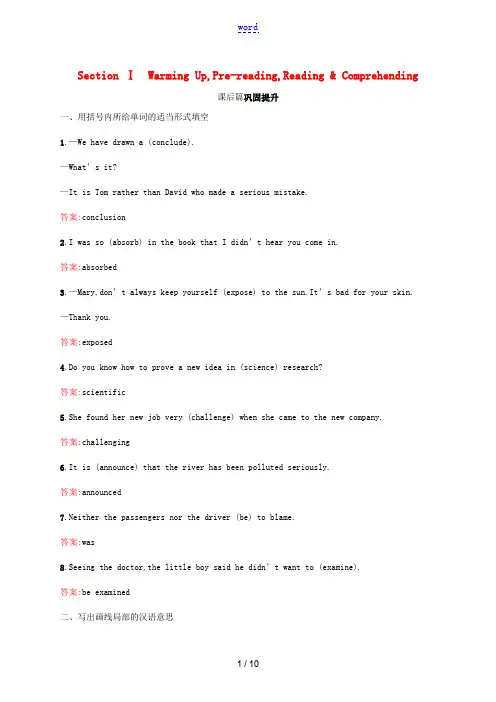
Section ⅠWarming Up,Pre-reading,Reading & Comprehending课后篇巩固提升一、用括号内所给单词的适当形式填空1.—We have drawn a (conclude).—What’s it?—It is Tom rather than David who made a serious mistake.答案:conclusion2.I was so (absorb) in the book that I didn’t hear you come in.答案:absorbed3.—Mary,don’t always keep yourself (expose) to the sun.It’s bad for your skin. —Thank you.答案:exposed4.Do you know how to prove a new idea in (science) research?答案:scientific5.She found her new job very (challenge) when she came to the new company.答案:challenging6.It is (announce) that the river has been polluted seriously.答案:announced7.Neither the passengers nor the driver (be) to blame.答案:was8.Seeing the doctor,the little boy said he didn’t want to (examine).答案:be examined二、写出画线局部的汉语意思There was an explosion in a big storehouse.No one had foreseen 1. it and the neighbourhoods 2. near it were affected seriously.Many of the victims 3. were sent to the nearest hospital.And the physicians 4. did all they could to save theinjured.However,the accident’s consequence was severe 5. and some firemen died.We should learn from the explosion and avoid such accidents.答案:1.预料,预计 2.居民区 3.受害者 4.医生5.严重的三、单句填空1.I wanted the children to keep (expose) to the language and culture.答案:exposed2.This medicine will cure him his cough.答案:of3.To our surprise,the man,who was looked down upon by others in the past,is now control of the whole project.答案:in4. conclude,I’d like to say how much I’ve enjoyed staying here.答案:To5.His expression suggested that he (be) angry.答案:was6.Nobody is to blame it.答案:for四、翻译句子1.将你的手表拨快些,它慢了五分钟。
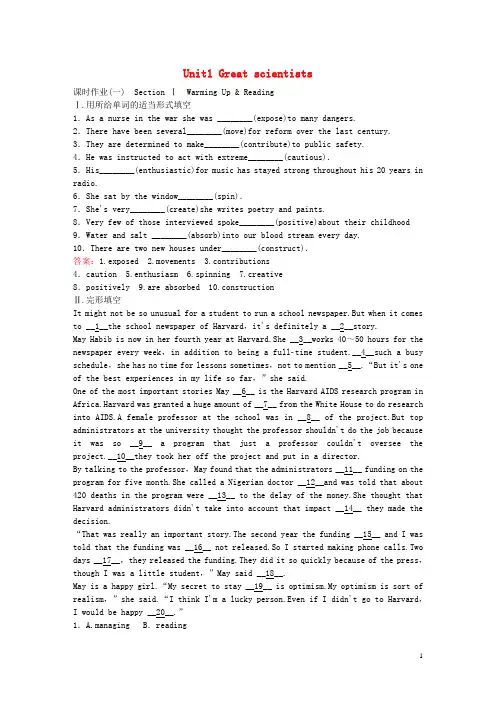
Unit1 Great scientists课时作业(一) Section ⅠWarming Up & ReadingⅠ.用所给单词的适当形式填空1.As a nurse in the war she was ________(expose)to many dangers.2.There have been several________(move)for reform over the last century. 3.They are determined to make________(contribute)to public safety.4.He was instructed to act with extreme________(cautious).5.His________(enthusiastic)for music has stayed strong throughout his 20 years in radio.6.She sat by the window________(spin).7.She's very________(create)she writes poetry and paints.8.Very few of those interviewed spoke________(positive)about their childhood 9.Water and salt ________(absorb)into our blood stream every day.10.There are two new houses under________(construct).答案:1.exposed 2.movements 3.contributions4.caution 5.enthusiasm 6.spinning 7.creative8.positively 9.are absorbed 10.constructionⅡ.完形填空It might not be so unusual for a student to run a school newspaper.But when it comes to __1__the school newspaper of Harvard,it's definitely a __2__story.May Habib is now in her fourth year at Harvard.She __3__works 40~50 hours for the newspaper every week,in addition to being a fulltime student.__4__such a busy schedule,she has no time for lessons sometimes,not to mention __5__.“But it's one of the best experiences in my life so far,”she said.One of the most important stories May __6__ is the Harvard AIDS research program in Africa.Harvard was granted a huge amount of __7__ from the White House to do research into AIDS.A female professor at the school was in __8__ of the project.But top administrators at the university thought the professor shouldn't do the job because it was so __9__ a program that just a professor couldn't oversee the project.__10__they took her off the project and put in a director.By talking to the professor,May found that the administrators __11__ funding on the program for five month.She called a Nigerian doctor __12__and was told that about 420 deaths in the program were __13__ to the delay of the money.She thought that Harvard administrators didn't take into account that impact __14__ they made the decision.“That was really an important story.The second year the funding __15__ and I was told that the funding was __16__ not released.So I started making phone calls.Two days __17__,they released the funding.They did it so quickly because of the press,though I was a little student,”May said __18__.May is a happy girl.“My secret to stay __19__ is optimism.My optimism is sort of realism,”she said.“I think I'm a lucky person.Even if I didn't go to Harvard,I would be happy __20__.”1.A.managing B.readingC.hearing D.writing2.A.boring B.simpleC.easy D.different3.A.actually B.hardlyC.usually D.really4.A.Due to B.According toC.But for D.Instead of5.A.beliefs B.sportsC.accidents D.attitudes6.A.covered B.talkedC.spoke D.took7.A.duty B.moneyC.work D.pay8.A.front B.faceC.charge D.time9.A.important B.weakC.light D.regular10.A.And B.SoC.Or D.But11.A.advised B.missedC.delayed D forgot12.A.aimlessly B.immediatelyC.slowly D.continuously13.A.caught B.broughtC.tied D.led14.A.when B.as ifC.even if D.after15.A.came across B.came outC.came away D.came up16.A.even B.everC.just D.still17.ter B.beforeC.ago D.then18.A.nervously B.proudlyC.madly D.curiously19.A.sad B.upsetC.happy D.grateful20.A.at last B.in timeC.as well D.once more语篇解读:本文是一篇记叙文。
高二英语必修五《Unit 1 Great scientists》教案【导语】增加内驱力,从思想上重视高二,从心理上强化高二,使克服高考的这个关键环节过硬起来,是“志存高远”这四个字在高二年级的全部说明。
作者高二频道为正在拼搏的你整理了《高二英语必修五《Unit 1 Great scientists》教案》期望你爱好!教案【一】教学准备教学目标1.Students learn some new words and expressions to describe people ,especially famous persons;2.Students are encouraged to give more information about famous persons who they are familiar:3. Students can realize that it is scientific spirit that makes those scientists successful.教学重难点1. Words and expressions in this unit2. Previous knowledge of some of the famous scientists3. Comprehending the text教学进程【导入】Words learning(Students are assigned to learn the new words of thisunit and find out the English explainations of the new words )Definitions or explanationsA.examine 1.general principles of an art or scienceB.repeat 2.say or do againC.theory 3.at once; without delayD.immediate 4.look at...carefully in order to learn about or from...EXplete 5.of great value, worth or useF.valuable 6.having all its parts; whole; finishedG.announce 7.make knownH.control 8Xe or bring to an endI.positive 9.power to order or directJ.conclude 10.quite certain or sure【讲授】useful sentences learning(The sentences are picked from the text.)1.“All roads lead to Rome, ”he encouraged me after I failed the entrance examination.2.This sentence doesn’t make any sense.3.Our English teacher is not only strict with us but also friendly to us.4.He is good-looking, apart from his nose.5.It is announced that the spacecraft, Shenzhou Ⅵ, landed on the earth successfully.6.It is not Tom but you who are to blame.7.In 1995, the Chinese government put forward a planfor“rejuvenating the nation by relying on science andeducation”.And it has helped Chinese scientists make many breakthroughs.8.Have you drawn any conclusion after you read this passage?9.Well done.So much for the learning of the new words and expressions.【讲授】Introduction of a classic articleTeacher introduce a famous person --Qian Xuesen and students learn to write an article about the famous scientis using the words and expressions they just learn in class.【活动】Share the outcomeStudents share their article orally and discuss whether they have used some good and advanced expressions.【练习】Consolidation完成句子(1)爱因斯坦被认为是二十世纪最伟大的科学家之一。
Unit 1 Great Scientists Section 1 Warming up Pre-reading,Reading & ComprehendingⅠ.单词拼写1.________(暴露)to so many advertisements, we can't help being persuaded to buy something we don't really need.2.Has the government________(宣布) that they will build a new highway to the mountain?3.The babies are well________(照顾) in the popular nursery.4.Finding a solution to this problem is one of the greatest________(挑战)faced byscientists today.5.He________(结束) his speech with an interesting story.6.He works in a sports centre i______ people in the use of the gym equipment.7.The army was well-trained and well-armed, and had little difficulty d______the enemy.8.The drug is s______of causing over 200 deaths.9.The doctor is well-known for having c______ some people of the deadly disease.10.Those who can f______difficulties on their way to success may keep calm when they really appear.答案:1.Exposed 2.announced 3.attended 4.challenges5.concluded 6.instructing 7.defeating 8.suspected9.cured 10.foreseeⅡ.选词填空2.The idea you________at the meeting yesterday is more practical than his.3.The public want to know who________for the accident.4.The doctor examined the patient carefully and then________.5.The police promised to________the accident.6.It is very dangerous to________patients with Ebola viruses(埃博拉病毒)without any protection.答案:1.is absorbed into 2.put forward 3.is to blame 4.drew a conclusion 5.look into 6.be exposed toⅢ.完成句子1.Why did you ________ ________ (提出) such a view at yesterday's meeting?2.I ________ ________ ________ ________ (正入神地读) this book that I didn't hear you come in.3.Were you________ ________(注意听)what she was saying?4.They ________ ________ ________ (得出了不同的结论) from the facts.5.We must send someone to ________ ________ (调查) the matter.6.It is a serious illness, but ________ ________ ________ (能被治愈).7.________ ________(每次)I catch a cold, I always drink much water.8.We don't know who is________ ________ ________(负责)the accident.答案:1.put forward 2.was so absorbed in 3.attending to 4.draw different conclusions 5.look into 6.can be cured 7.Every time 8.to blame for Ⅳ.完形填空I recently heard a story about afamous scientist who had made several very important medical breakthroughs(突破).He was being interviewed by a reporter who asked him__1__he thought he was able to be so much more__2__than the average person.He responded that it all came from a(n)__3__with his mother that occurred when he was about 2. He had been trying to__4__milk from the fridge when he__5__the slippery(光滑的) bottle, its contents running all over the kitchen floor.When his mother came in,__6__shouting at him or giving him a lecture, she said, “Robert,what a great and wonderful__7__you have made! I have__8__seen such a huge pool of milk. Well, the damage has already been__9__. Would you like to get down and__10__in the milk for a few minutes before we clean it up?”Indeed, he did.After a few minutes, his mother sai d, “Robert, whenever you make a mess like this, eventually you have to restore everything to its proper order. So, how would you like to do that? We could use a sponge(海绵), a towel or a mop. Which do you prefer?” He chose the sponge.His mother then said, “You know, what we have here is a__11__experiment in how to effectively carry a big milk bottle with two__12__hands. Let's go out in the backyard and fill the bottle with water and see if you can__13__.”The little boy learned that if he__14__the bottle at the top near the lip with both hands, he could carry it without dropping it. What a wonderful__15__!This scientist then said that it was at that moment that he knew he didn't need to be__16__to make mistakes. Instead, he learned that mistakes were just __17__forlearning something new, which is, __18__,what scientific experiments are all about. Even if the experiment “doesn't__19__”, we usually learn something__20__from it.文章大意:一位科学家为什么能够与众不同?这与他母亲的教育有关。
Unit 1 Great Scientists Section Ⅱ Warming Up &Reading-Language PointsⅠ.单句语法填空1.________(scientific)has taught us how atoms are made up.2.What conclusion do you draw________the research?3.Teaching young children is a________(challenge)job.4.When I opened the door,I found my father sitting in his chair,completely absorbed________the newspaper.5.Please________(analysis)the case according to the fact.6.The concern of this book is with air________(pollute).7.Please read the________(instruct)carefully before using it.8.The talks are continuing,but no________(announce)are expected at this time.9.The incident________the weakness of the school's position.(expose)10.We consider that you are________(blame)for the accident.【答案】 1.Science 2.from 3.challenging 4.in 5.analyse 6.pollution 7.instructions8.announcements 9.exposed 10.to blameⅡ.单句改错1.Jenny has been attending on her sick mother for many years.________________________________________________________________2.The child was cured his bad habit with the help of his friends.________________________________________________________________3.Exposed to the polluted air did harm to his health.________________________________________________________________4.We got together at the night he returned from abroad.________________________________________________________________5.When will you have your homework hand in?________________________________________________________________【答案】 1.on改为to 2.cured后加of3.Exposed改为Being exposed4.去掉at 5.hand改为handedⅢ.阅读理解【导学号:01730026】A list of Benjamin Franklin's inventions reveals a man of many talents andinterests.His natural curiosity about things and the way they work made him try to find ways to make them work better.Ben had poor vision and needed glasses to read.He got tired of constantly taking them off and putting them back on,so he decided to figure out how his glasses would let him see both near and far.He had two pairs of glasses cut in half and put half of each lens(镜片)in a single frame.Today,we call them bifocals(双光眼镜).Everyone knows the story of Ben's famous kite flight.Although he made important discoveries and advancements,Ben did not “invent”the electricity.He did,however,invent the lightning rod which protects buildings and ships from lightning.In colonial America,most people warmed their homes by building a fire in a fireplace even though it was dangerous and used a lot of wood.Ben figured that there had to be a better way.His invention of an iron furnace stove allowed people to warm their homes less dangerously and with less wood.The furnace stove that he invented is called the Franklin Stove.Interestingly enough,Ben also established the first fire company and the first fire insurance company in order to help people live more safely.As a postmaster,Ben had to figure out routes for delivering the mail.He went out riding in his carriage to measure the routes and needed a way to keep track of the distance.He invented a simple odometer(里程表)and attached it to his carriage.Later,other famous inventors,like Tomas A.Edison and Alexander Graham Bell,followed in Ben's footsteps by trying to find ways to help people live better.【语篇解读】本文主要讲述了本杰明·富兰克林的一系列的实用发明物。
Unit1 Great Scientists 一、教材分析: 高二第一单元的中心话题是“科学家”,具体涉及科学家的名言、轶事、科学家的成功之道及如何向科学家学习等。语言技能和语言知识几乎都围绕介绍“科学家”这一中心话题设计的。我上的这节课是本单元的第二节阅读训练课,包括读前、阅读和读后三部分。读前部分要求学生带着问题阅读文章,以求得学生对部分细节的理解。找到文章中的有关章节并不难,难点在于要求学生用自己的语言概括出来。阅读部分的文章介绍了著名物理学家Stephen Hawking 的生平,他的系列探索发现和他对科学研究的态度、观点。 StephenHawking在物理界享有至高的荣誉和威信,是深受许多科学家和广大物理迷尊重和崇拜的学者。他不为病魔和瘫痪所吓倒,而以惊人的毅力和信心成为物理界探索宇宙的先锋,并界乐观地面对生活。读后部分设计了三组习题。第一组习题的三个问题考查学生对文章内容的记忆程度;第二组的三个问题让学生反馈对的了解;第三组习题让学生以两两对话形式讨论如何运用科学方法解决问题,培养学生的想象力与创造力。这一节课的重点在于文章的阅读,读前起到导入作用而读后则是对学生所学知识的复习与巩固。 二、教学目标(知识目标、能力目标、情感目标): 知识目标: 1学习掌握有关人物的介绍性文章的阅读方法和技巧; 2在认知理解课文的基础上,掌握运用文章中所出现的常用的句型和短语、词语等。 能力目标: 1发展学生听、说、读、写的基本技能,提高阅读技巧,培养综合运用语言的能力; 2培养学生能利用上下文来猜测词义和能欣赏文章的写作技巧的能力 3能根据所读材料运用适当的语言进行简短的交流。 情感目标: 通过本文向学生展示伟大科学家的科学精神和人生观,使学生形成积极的情感态度,从而能在生活中勇敢面对任何挫折,不被困难打倒,在学习和工作中能主动探索积极进取。 三、教学重点、难点: 1了解人物简介的文体特点,并以此指导阅读; 2训练skimming, scanning, careful reading等阅读技能; 3对文章深层次的理解及细节的欣赏及对人物的评价 四、学情分析: 高二的学生经过一年的学习,在知识和能力方面的有所提高,所以英语教学不能简单地定位于让学生记住生词或者短语、句型,而要引导学生在阅读的过程中学会分析和欣赏。但同时对于大部分学生来说,英语还是相当难的一个学科,所以在教学过程中,注意提高课堂的趣味性,激发学生的兴趣也极其重要。并且,本单元山学生在新学期的第一课,学生门对新的学期充满信心,通过对Stephen Hawking 的学习,了解也能进一步促进学生学习科学家的精神,更加努力奋斗,自强不息。 五、教学方法: 新课标要求课堂教学要尽可能把时间还给学生,所以在课堂教学中,教师的基本任务是“导”,既起到组织和引导作用。所以在授课中,我更注意采用多种方法启发、诱导学生积极主动地参与教学活动中。本课采用影象导入,利用多媒体播放一些学生熟悉的著名的科学家的资料,引出有关 Stephen Hawking 的话题,然后使用提问、启发、分析、归纳的方法,是学生掌握教材内容,培养学生阅读和分析的能力。在学生阅读过程中,我注意设置难度不同的各项任务,让学生在完成各项任务的同时,提高阅读能力,然后在学生掌握文章内容的基础上适当点拨文章中短语或者句式结构等。
Period 1 Warming up &Reading Teaching Aims: 1. Get to know some new words and expressions 2. Know some great scientists and their achievements. 3.Analyze the common qualities these scientists share and revise how to describe people’s characteristics. Difficult and Important Points: 1. Word study 2. Describe main contributions of the great scientists. 3. Make up a dialogue between two scientists about their inventions/discoveries and their plan for the future. Teaching Methods: 1.Analyzing 2.Individual & Pair work 3.Teams match Teaching Procedures: Step 1 Leading in Introduce some famous scientists and their achievements, and then do the quiz. 1. Can you remember them? (Stephen Hawking & Yuan Longping) Have a revision of the expressions: theory, black holes, super hybrid rice. 2. Play a guessing game. Show sentences one by one about scientists’ contributions, and let Ss guess who they are. Ss should compete to answer as soon as possible. Then share some famous sayings by the great scientists, to inspire Ss to learn from them. Each student represents his/her team and gains points for his/her team. Step 2 Warming up 1. Try this quiz and find out who knows the most. (Pair work to finish the Quiz Questions on P1.) Give Ss enough time to understand the questions in the quiz, and they are allowed to discuss with their partners. T walks around to give help. 2. Check the answers with the whole class. Then ask Ss about these scientists. If they don’t know, show the further introduction to these 10 scientists. 1).Archimedes (an ancient Greek mathematician & physicist) 2).Charles Darwin (British, author of The Origin of Species) 3).Thomas Newcomen (British, improved the first steam pump and turned it into a steam engine for taking water out of mines in 1712 .James Watt improved it and turned it into the first modern steam engine used on the railways. ) 4). Gregor Mendel (Czech) 5).Marie Curie (Polish and French, won two Nobel Prizes) 6).Thomas Edison (an American inventor) 7).Leonardo da Vinci (a famous Italian artist) 8).Sir Humphry Davy (British) 9).Zhang Heng (Chinese, invented seismograph) 10).Stephen Hawking (a British astronomer) Step 3 Brainstorming 1. Now that we’ve learned so many great scientists, let’s draw a conclusion about them. What common characteristics do they have? Attention: In this part, Ss may list many other adjectives which they have learned before to describe scientists. So the major job of T should be leading in these new expressions and make some connection between the old and the new, for example, bright can be equal to clever or wise, strict can be similar to serious, co-operative means work along well with others, enthusiastic means full of love for their jobs, and so on. So it is better for T to explain the new words in English-English way. But if the Ss are not so good at English, T can use some Chinese if necessary. enthusiasticco-operative positivebright common characteristicsstrictpersuasive cautious creative 2. Draw a conclusion about them in sentences: They all… Eg.made a great contribution made great achievements succeeded in their scientific career overcome many difficulties Step 4 Pair work Make up dialogues. It’s a pity that these great minds can’t get together. So now we’ll organize a party for them. Because of an advanced machine called Time Machine, all scientists from all different times can come to attend it. Now they’re talking to each other. Make up a dialogue between two scientists. They may talk about their achievements, their life and their plan for the future work. They may talk about these 1.I wonder if you’re… 2.I know you because I’ve heard that you… 3.Thank you for knowing so much about me. 4.I’m the one who… 5.I’m really interested in your invention. …… They may ask about these What’s your nationality? (I’m from…) What are you interested in? What conclusion have you drawn? What are you proud of? What leads to your success? (My cautiousness/ creativeness/ determination…leads to…) Step5 Summary Step6 Homework 1.Tellyour partner about the great scientists and their achievements. 2. Revise the new words and expressions learned in this lesson, and preview those of the reading text. Teachingreflection: